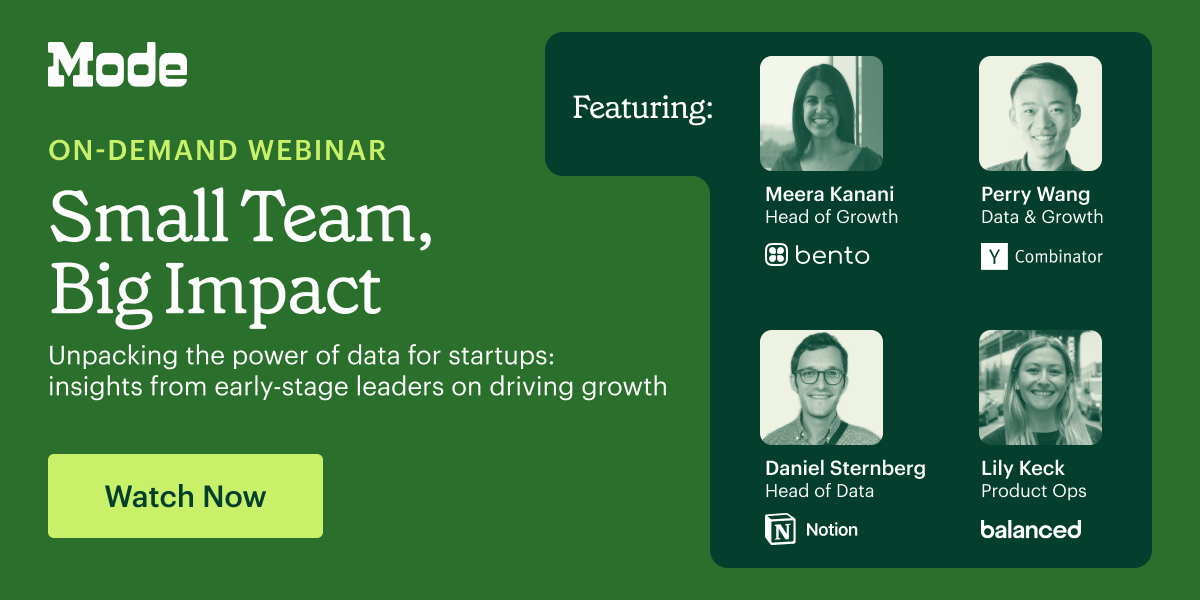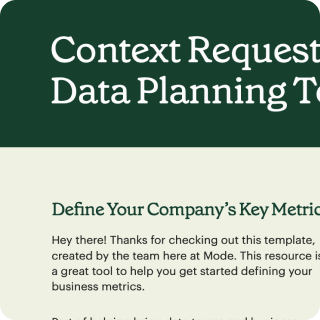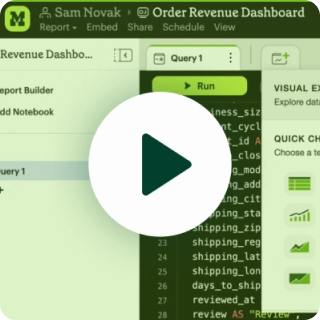Small Data Teams, Big Impact: Webinar Recap

Lucas Stewart, Mode team writer
April 24, 2023
NaN minute read

We hosted a webinar with data leaders at early-stage and high-growth startups on how small data teams can make a big impact at their organizations.
Some of them have grown to be data leaders of larger teams, but at some point, all of them had experience planting the first seed of the data culture in their organizations.
They shared how they prioritize requests, build trust in data within their small teams, and how they make sure they're focusing on supporting core business use cases. Read on for the highlights of this panel Q&A moderated by our own Jake Walker, Head of Customer Enablement at Mode.
Thank you to our panelists:
Lily Keck, Product Operations at Balanced
Meera Kanani, Head of Growth at Bento
Daniel Sternberg Head of Data at Notion
Perry Wang Data & Growth at Y Combinator
Building a data-driven culture
Jake: Tell us about the data culture in your organization. How are you using data to drive growth within your organization?
Lily Keck: Our entire company is 18 people. I’ve been lucky in that curiosity is a shared trait at the company. Everyone is really interested in the data. That helps disseminate information among the whole team. We really value continuous innovation and growth. Data has been a part of every project, which is cool.
Jake: Daniel, you are now at Notion, a larger company, but you helped scale the data team at Gusto for 6 years. How did you see the data culture evolve at Gusto as the team got larger?
Daniel Sternberg: We boiled the ocean a little too much early on, trying to give everyone self-service access. It created a situation where we were understaffed to support that infrastructure. We weren’t really ready to support all the use cases across the company, with about 300 people. Trust in data is a very delicate thing. We had infrastructure issues, and people were unsure if they could trust the data they were looking at.
One of the things I learned from that, and that we fixed over time, was the need to focus on the core places in the business where we need to have really strong, rock-solid reporting, so that people have trust in that part of the data. Then, people really started to see the value.
Jake: Perry, from the Y Combinator side, is there any difference to what the others have said?
Perry Wang: What everyone said really resonates with me. We give founders much of the same advice.
The big factor is really about focus. What are the core tables that the company needs? What are the core analytics and reports that are really important to the business? As you build that relationship, that gives the data team a lot of trust to build other core parts of the business that might not be table stakes.

Join Mode's Live Weekly Demo
Join a group session for an introductory demo of the Mode Platform. We’ll walk through key features and workflows.
Data teams and cross-functional partners
Jake: That’s a great point. On cross-functional relationships, what do those relationships look like and how much involvement do cross-functional partners have in the evolution and usage of your data?
Daniel Sternberg: If I look at where I’m at in Notion today, some of the most key [data team] partnerships, especially at startups, tend to be with growth teams. It’s the place where I think there’s the most leverage and impact that people can really measure leveraging data more heavily, quickly.
Lily Keck: Individual communication is huge for cross-functional relationships. We’re DTC and our tech product is actually just a vehicle for our product, which is workout videos. So things like predicting how many people will be in a live class, or whether people will stay on the app—it can be different than for tech companies where the tech product is the core offering. For cross-collaborative stakeholders, it’s important to consider the priorities of your product, or the company itself. For me, it’s especially interesting to work with the member experience team.
Data team prioritization
Jake: For small teams in general, especially one-person departments, how do you prioritize your time?
Lily Keck: Good question. It’s mainly trying to understand what the business needs are at the moment.
Meera Kanani: One approach we use is defining crystal balls and rubber balls every week. Crystal balls you can’t drop; they will break and affect something really negatively. Rubber balls you can drop and pick back up when the timing is right. That helps ensure to know the things you can’t de-prioritize. To define a crystal ball, that’s where the data comes into play [to define priorities].
Perry Wang: For us, it’s really about focusing: how do we simplify the key drivers of growth for these founders? What are the levers we focus on, and what are the levers that might not be important? Focus on the ones that matter to the goals of the business today.
Processes & tools
Jake: Processes can be just as important as technology, and I’m curious whether you think they play an equal or more prominent role to the tools you have at your disposal?
Perry Wang: You have to be really intentional about this meld between process and technology. We have great tools, but it doesn’t mean you toss the process out the door. There’s a balance.
Jake: Meera, on what you said about the creativity required of a small team; how do you build yourself up to say, now that we’ve done something good — how do we codify it?
Meera Kanani: The first step of the process is: what question are we answering? The data is only as good as the clarity of what you’re trying to get to. Understanding those questions helps determine what needs to be codified and turned into a process. Is it a one-time ask, or something you’ll do every month?
Another key distinction is what do you rely on your gut, or qualitative data for, and what do we need quantitative data to inform? Determining this sooner rather than later can determine what you need processes for [to avoid making gut-based decisions on something where data clearly suggests a course of action].
Jake: The current economic climate is… let’s say, sporadic overall. I’m curious if that’s affected any changes on your teams.
Daniel Sternberg: I don’t think [the current economic climate] has affected the demand for data. I’ve been reflecting on the low interest rate period in the data world that we need to think more about now.
It was very common to see people grow large armies of analytical data scientists. We’ve seen evidence that [data] teams are more affected by the layoffs recently. That doesn’t mean there’s no demand for data, but this does illustrate that you need to think about the ROI of where you put people in data. We were talking about prioritization before—where do we need to rely on data?
Q&A - Questions from the Audience
Question from Will: What are your thoughts on team leads “skilling up” into director or heads-of-data type roles? How does one begin to think about data strategy, headcount, and data stack?
Jake: I used to be a Head of Data before I joined Mode. Context matters, so understanding what different verticals and different orgs do. Trust your people and trust others around you.
Daniel Sternberg: People don’t always know how to work with someone in that role. You need to be proactive in terms of asking other leaders at the company: Where are we going with data? Why are you making the specific prioritizations and investments right now at the core level of how we work with data? It’s easy to get stuck in the weeds about the specific needs of people at the company.
Question from Marlene: With small teams, there tends to be some assigned roles and duties, or divide-and-conquer, or nuanced roles. How do you handle some duplication in knowledge, especially if someone leaves the company?
Meera Kanani: We’ve talked a lot today about the balance between art and science, process and not process. You’ll never regret documenting what you did—even if it’s just for yourself! It can help to over-index on documentation so that knowledge sharing becomes much easier when it becomes relevant again, rather than trying to reinvent the wheel.
Ethan: I’m a new PM at a fintech startup of 10 people. We have no data people; just me, a marketing manager, and a head of UI/UX, and our dev team. How should we be leveraging data on such a small, lean team?
Lily: I totally get that; technically, I’m product ops. First of all, making sure it’s a priority across the organization is important. When you just have a few people using your platform, although they may not be statistically significant they can be directional. If you add it into every conversation, it can endanger a data-driven culture.
Jake: yes - federating as much information as possible really matters!
Jake: Perry, any advice for small teams, or even with no data people?
Perry: If you’re the PM, understand the product! Draw it out, and then understand where the levers are. Then, track those metrics. Your engineering team will be excited to join you on that journey, when you all have a clear picture of what matters, and how to track it.
What is Data Governance? Framework and Examples
The complete guide to a data governance strategy that ensures flexibility and safety.
Get our weekly data newsletter
Work-related distractions for data enthusiasts.




